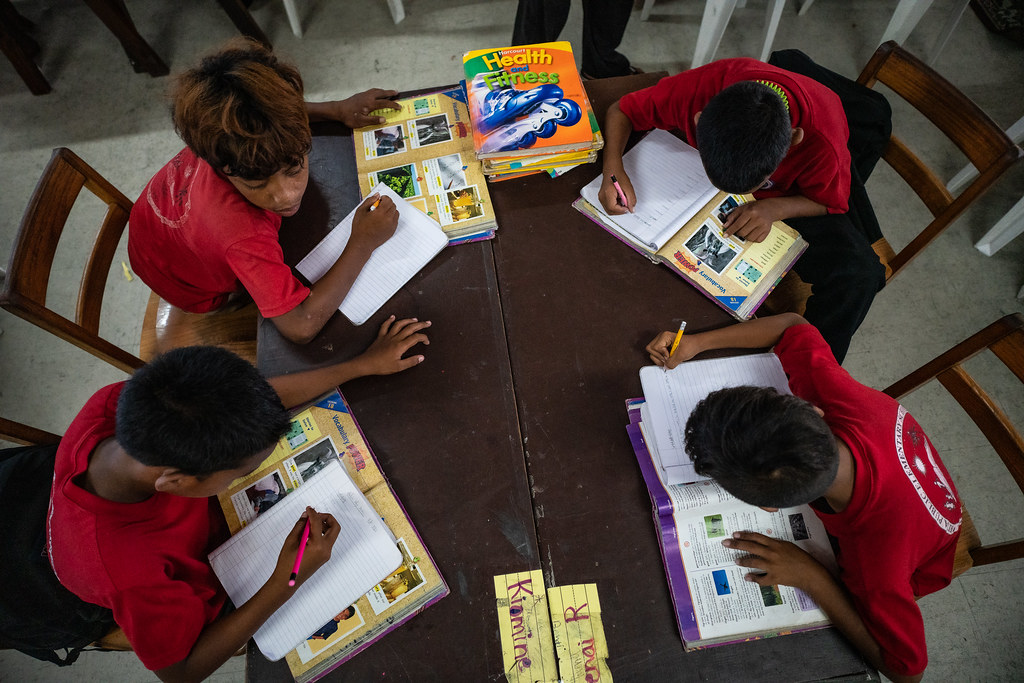
RMI Education and Skills Strengthening Project
The Government of the Republic of Marshall Islands has gotten financing from the World Bank for the Education and Skills Strengthening Project (ESSP) expense. It intends to use part of the earnings for seeking advice from services.
The consulting services ("the Services") will assist the Project Manager and the RMI National Training Council in carrying out the World Bank-funded project successfully.
The project will concentrate on supporting the Project Implementation Unit (PIU) in developing a structure for Recognition of Prior Learning (RPL) for TVET, focused on helping the College of the Marshall Islands and the RMI National Training Council examine and boost the skills of employees through accredited college certification.
The comprehensive Terms of Reference (TOR) for the task are shown in the connected Terms of Reference (ToR).
The National Training Council now invites eligible individuals ("Consultants") to suggest their interest in providing the Services. Interested Consultants should offer details showing that they have the needed credentials and appropriate experience to perform the Services (connect a Cover Letter of no more than 4 (4) pages dealing with the mandatory experience and credentials requirements curriculum vitae with a description of experience in similar assignments, similar conditions, and so on). Companies' staff may reveal interest through the utilizing company for the task. In such a circumstance, only the experience and qualifications of people shall be thought about in the selection process. The criteria for electing the Consultant are: A.
Mandatory Qualifications and Experience Master's degree in education, training
, management, or an associated field. Minimum of 5-10 years of experience working in TVET System. Curriculum Design and Systems.
Possess 2-5 years' experience creating and
executing RPL. structures, policies, and treatments. A sample of previous work will be required as evidence of previous experience. Excellent interaction, training, and facilitation
abilities. Experience with working with varied stakeholders, consisting of federal government. agencies, TVET organizations, companies, and learners in the Pacific. B. Desired Qualifications and Experience Ability to deal sensitively in a multicultural
environment and build efficient team relationships with customers and appropriate stakeholders. The attention of interested Consultants (consisting of firms )is drawn to paragraphs 3.14, 3.16 and 3.17 of the World Bank's"
Procurement Regulations for IPF Borrowers "July 2016 modified November 2020" Procurement Regulations ", setting forth the World Bank's policy on conflict of interest. Further details can be acquired at the address listed below during workplace hours, 0900 to 1700 local time. Expressions of interest must be
delivered in a written type to the address listed below (in person or by e-mail )by 5:00 pm, 23rd December 2024.
The subject line ought to state:"National Training Council Strategic Plan Consultant -full name of the candidate". Julius Lucky Director National Training Council!.?.!ntcdr@ntcinfo.org:Phone: 692 625-4521 Empowering Community Champions for Sustainable Development in rmi national training council Gender Equality, Climate Resilience and Water Safety Training Majuro,
Republic of the Marshall Islands: The 4th
Women and Youth Training for
Gender Equality, Climate Change, Disaster Risk Reduction and Water Safety Management has recently occurred at the University of the South Pacific's school in Majuro, the Republic of the Marshall Islands(RMI ). This essential training was arranged by the United Nations Development Programme( UNDP )Pacific Office through the Addressing Climate Vulnerability in the Water Sector(ACWA) task. The week-long capacity-building training aimed to empower women and youth with the knowledge and practices needed for climate-resilient water safety management in the
Republic of the Marshall Islands(RMI ). This training enhances a commitment to enhancing RMI's water security and neighborhood strength versus environment modification impacts, specifically females
and youth, making sure that nobody is left behind. The training welcomed participants from all 24 atolls and included resource speakers from government companies, non-governmental companies, and worldwide development partners from the RMI Environmental Protection Authority, Climate Change Directorate, Office of the Chief Secretary, Ministry of Culture and Internal Affairs, National Disaster Management Office, Women United Together Marshall Islands, rmi national training council Human Trafficking Task Force, Waan Aelõñ in Majel, Jo-Jikum, and the International Organization for Migration. In her opening remarks, Secretary for the Ministry of Culture and Internal Affairs, Brenda Alik, underscored the significance of cumulative action in building a climate-resilient country."It is our duty to come together and work together. As we face the obstacles posed by climate modification, comprehending its effect on our water resources is important for improving the well-being of neighborhoods throughout the Marshall Islands,"she stated.
rmi national training council Environmental Protection Authority General Manager Moriana Philip highlighted in her speech the vital role of women and youth in resolving climate-related obstacles."This workshop unites us from numerous communities to resolve the pressing problems we deal with today, including climate-related difficulties, particularly on our water resources."We want to stress the crucial role of ladies and youth in this task as your involvement is instrumental to its success and beyond, "she stated.
The very first day of the workshop covered critical issues connected to gender equality, human rights, and public health within the Marshall Islands. It included discussions on gender equality and mainstreaming, concentrating on the effects of climate change on water security and the out of proportion results on vulnerable groups. The importance of integrating gender equality and social addition into all project aspects was also talked about. Human rights and human trafficking were tackled, worrying the need for thorough protection of susceptible populations
throughout emergency situations. Additionally, the workshop dealt with gender-based violence, highlighting the numerous kinds that can develop in disaster scenarios, such as domestic violence and sexual browbeating. The program concluded with a concentrate on sanitation and hygiene and their important function in health, incomes, school attendance, self-respect, and building durable neighborhoods. ACWA Project Manager Koji Kumamaru revealed his gratitude to all individuals
, emphasizing the importance of their contributions to their neighborhoods."Women and youth are crucial to the success of the ACWA job. More notably, you are the champs and future leaders who will return to your communities to empower others,"he stated. During the workshop, participants visited Rongrong Island and analyzed the 15,000-gallon Flatpack Modular water tank set up at the Rongrong High School Boys Dormitory as part of the ACWA job. The installation is a key element of the project, complemented by support from Australia
's Department of Foreign Affairs and Trade. The see served as an important direct experience of the positive effect of the ACWA job on the community and its
water resources. Marie Naisher from Jabat Island revealed her gratitude for the chance to sign up with the workshop and explained her desire to be part of the task when it reaches Jabat.
"This was my first time participating in such training, and I found out a lot from the guest speakers, group activities, and the website see. I now comprehend the significance of tidy water and how to sanitize it. I'm fired up about the ACWA project pertaining to Jabat and prepared to help when it gets here,"she stated. Don Kobney, an ACWA website coordinator from Santo, Kwajalein, also shared his excitement."The workshop and website check out increased my self-confidence and understanding of the water tank installation.
Seeing the 15,000-gallon flatpack modular water tank firsthand gave me a clear understanding of the system, and I'm looking forward to sharing this knowledge with my neighborhood, "he stated. By the workshop's end, individuals were much better equipped to comprehend climate change and its local impacts, drive adaptation and mitigation efforts, particularly in water security, and utilize brand-new resources to affect their communities positively. ACWA is made possible thanks to the support of the Green Climate
Fund, with the task co-financed by the Government of the Republic of the Marshall Islands
. The Marshall Islands: Skills Training and Vocational Education Project Evaluates the efficiency of the job and highlights lessons. Offers inputs to 2 broader examinations- the regional assessment of ADB assistance for the Pacific and the unique examination study on Millennium Development Goals. The low educational attainment and scarcity of Marshallese skilled workers were mainly due to the low quality of standard education, lack of access to education in the external islands, and weak points in skills training and the trade and technical education system.
These supported an economy marked by high unemployment because of constrained economic sector growth and federal government downsizing. Joblessness was particularly high among the youth and women in the outer islands. Appropriate local competent workers for existing job vacancies
were unavailable, thus the importation of properly competent foreign employees. Hence, there was a mismatch between readily available tasks and skills of the Marshallese labour force. These conditions offered the effort for the Government
of the Marshall Islands to focus on technical and trade education training reforms. In 2000, ADB authorized a loan for $9.1 million to improve abilities training to supply well-trained employees needed for sustained financial and social advancement. This was to be attained through an integrated national skills training system. The task consisted of 4 parts: advancement of a profession awareness program, skills training improvement, boosted skills training chances for women and youth, and institutional conditioning. The anticipated outcome was increased income-generating chances and employment for trainees, particularly ladies and youth in the outer islands. Overall, the project was rated unsuccessful. Restricted progress was achieved in making the job responsive to the requirements of its beneficiaries and private-sector companies. The long-standing weak point of poor numeracy and literacy proficiencies
among public elementary and secondary school graduates and dropouts going into college or going to voc-tech education could be partially attributed to the poor quality of basic education. The job was supply-driven and could not establish a strong linkage with economic sector requirements or align its activities with the needs of the labour market. The status of the technical and employment education training system has actually remained fundamentally the same after task conclusion. The research study put forward that ADB might encourage the Government of the Marshall Islands, through assessment and policy discussion, to follow through on the government's
dedication to establishing a devoted labour details system to connect technical and trade education training program offerings with industry demand. Although the job established a labour market details system, in the lack of in-house staff capability at the National Training Council, it was not completely functional.








